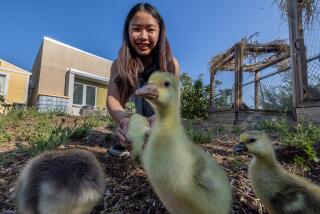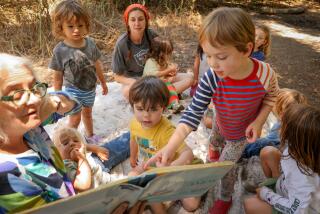Farm Plants the Seeds for Happy Life Among Troubled City Youngsters : Children: Green Chimneys, north of New York City, houses about 100 children ages 6 to 18. They learn to take responsibility and to feel capable.
- Share via
BREWSTER, N.Y. — Eleven-year-old Jerry Nunez is a child of the big city whose world was opened by a bunch of rabbits, especially an Angora named Joanna.
“They’re funny. I like how they run, their color, with their floppy ears,” said Jerry, one of the urban children who have come to the country to learn traditional school subjects and emotional stability, in large measure by working and living at the Green Chimneys Farm Center.
Jerry, who is from the Bronx, became particularly attached to a gray rabbit he named after his sister. The rabbit is pregnant, and the babies, he explained with authority, will be sold to buy animal feed.
Green Chimneys, a 150-acre farm 60 miles north of New York City, is home to about 100 children ages 6 to 18, most of them boys from New York City referred by the schools, courts or other agencies when their emotional troubles or behavior problems made it impossible for them to continue living at home.
Some are abused; some are children of drug addicts or convicts or prostitutes.
From the city streets, they come north for 2 1/2 to three years and learn to ride horses, raise goats, and grow food and flowers--as well as math and reading and responsibility.
At Green Chimneys, children often find subtle parallels with the lives they have left behind, said Stephanie Senter, the farm treatment coordinator, who tracks the children’s progress and documents the effect of the farm environment.
If a ewe is giving birth, for example, children are brought to the barn.
“What we have a chance to do is not only see a miracle happen,” she said, “but maybe the mother is sick and not taking care of the lamb. The kids are watching, and they’re thinking, ‘My mom took care of me,’ or ‘My mom didn’t.’ ”
When some of Joanna’s offspring from a previous pregnancy died, “it was traumatic, but she’s pregnant again,” Senter said. “Animals get sick. Animals die. And the kids know that.”
“Children and animals should grow up together,” Samuel B. Ross, Green Chimneys executive director, said in an interview in his ground-floor office, with a wall of windows open to the farm. A dog named Haggis lazes on the floor near a bird cage.
“The animals’ main contribution is to link the child with other children and adults,” he said.
A bond does not always form instantly, but children usually find their way within a week or two, said Paul Kupchok, the farm director. One of the first rough spots often is riding the horses.
Ernie Martinez, 15, was afraid at first. “But I tried it. If you’re scared of them, they’re afraid of you. When you get jumpy, they get jumpy. They have feelings too,” he said.
“When a kid can get on a 1,200-pound animal and learn to control it--it helps their confidence and self-esteem,” said Alice Johnson, the riding instructor. “They’ll get on a horse and just hug the horse and a smile spreads across their face.”
For centuries, doctors have noticed the value of animals to humans’ well-being, said Dr. Alan Beck, director of the Center for Applied Ethology and Human Interaction at Purdue University.
“We know that kids have an incredible interest in animals,” Beck said. “They are probably as important as computers for kids.”
There is evidence that children who have animals have better relationships with other children and communicate better. And most children who have contact with animals confide in them, Beck said.
For many of the kids at Green Chimneys, farm work, squeezed in here and there, also is a refuge.
“For the hour that a kid is up here, we can make him forget the fight he had with Bobby, the mother who is on drugs, the father on the streets, and only think about the horse he is feeding,” Kupchok said. The child returns to class with a mind clear for spelling or history.
Kupchok knows these children’s world is deteriorating, because those who came to Green Chimneys used to be 10 or 11, on average. Now the average is 8 or 9. “We never had kids who were 6, and now we do,” he said.
Four decades ago, Ross and his father bought what was then a dairy farm and opened a day-care center and boarding school, which eventually became a multiservice agency, including the residential treatment center.
It is funded with state, county and private money. Children share the land with 250 animals, including pet dogs who live in the dormitories.
A “learn and earn” program enables them to save money from farm chores. Last summer, 92 Green Chimneys children entered exhibits in the Putnam County fair. They also can take part in a wildlife rehabilitation program or act as guides to farm visitors.
And some return to the city streets with Farm on the MOO-ve, a traveling exhibit, showing off to urbanites who may never have seen a lamb.
They are not being trained to farm, but to nurture and be nurtured, to take responsibility and feel capable.
Some, however, stick with animals. On her return to New York City, one former resident got a job cleaning stables in exchange for riding lessons.
Twelve-year-old Kivie Vega displays a remarkable affinity for all sorts of animals, and he, too, wants to find a way to work with them when he goes home.
He reached under a white goose to show off her black and yellow gosling.
“I was the first one to notice she had a baby,” he said. “I like all animals. I don’t have favorites.”
How does he know so much?
“I sometimes watch National Geographic specials, and I like to read nature books, and I like to observe,” he said.
He looked at some yard animals and said: “You know how they call people chicken or turkey? It’s probably because of how these animals act.
“When I do leave, I sure am going to miss this place,” he said.
Going home is not always easy, Kupchok acknowledged.
“But there are very few kids who don’t choose home,” he said. “No matter how good it is for them (here), home means an awful lot.”
More to Read
Sign up for Essential California
The most important California stories and recommendations in your inbox every morning.
You may occasionally receive promotional content from the Los Angeles Times.











